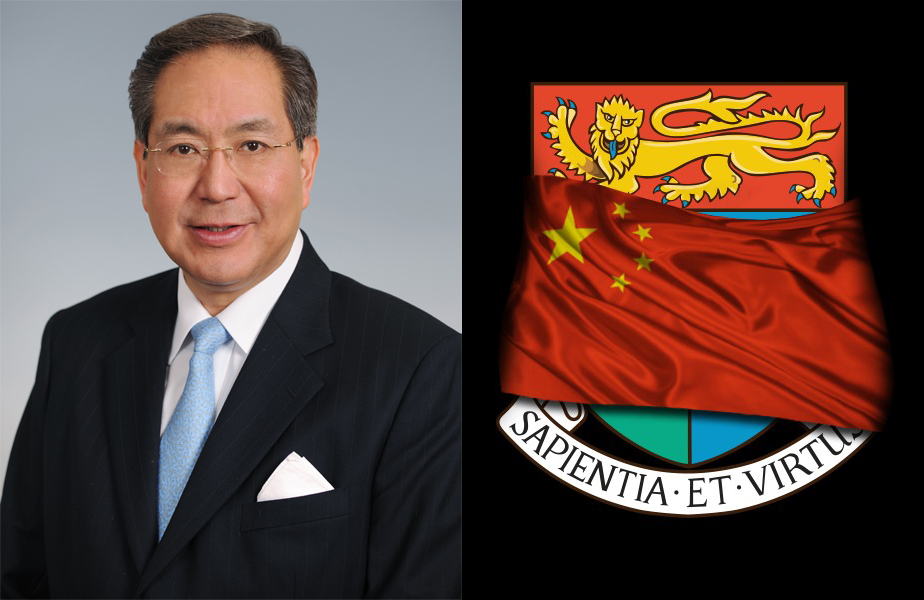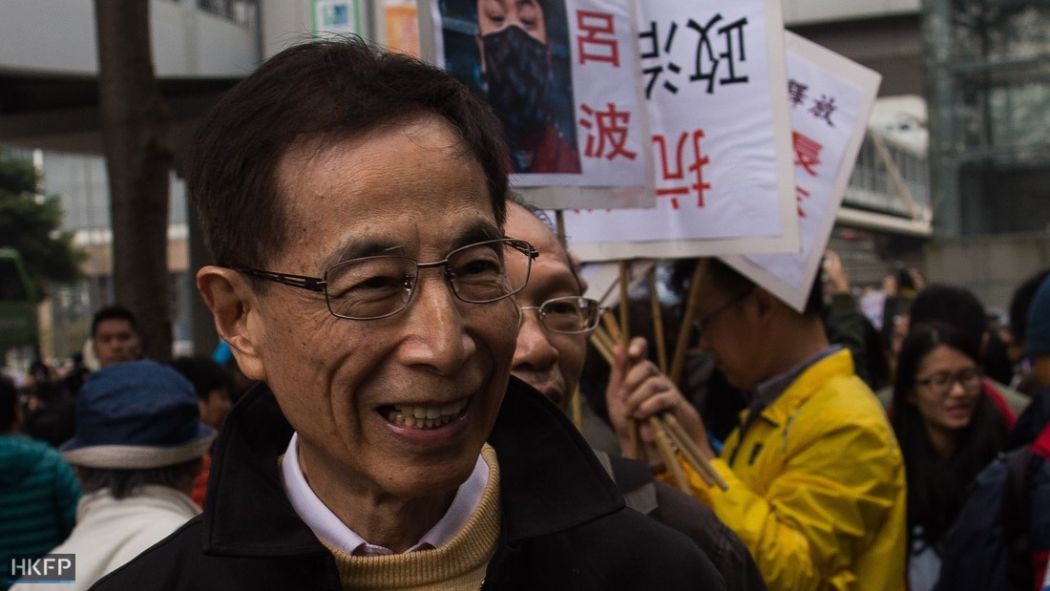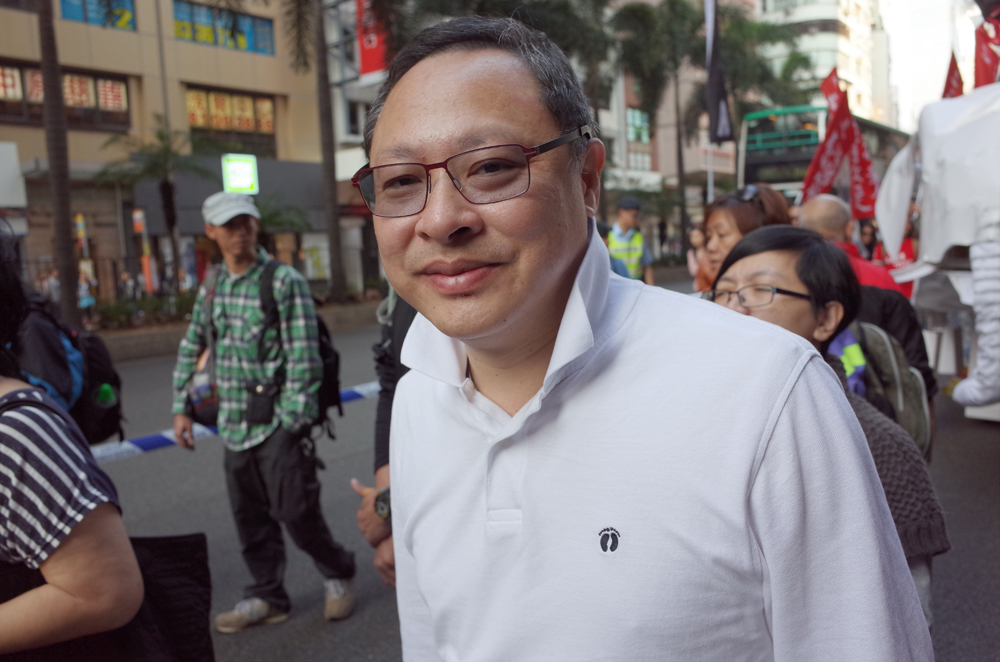Far from being deterred by the University of Hong Kong’s epic losing battle with Chief Executive Leung Chun-ying, the law school answered back with an event calculated to infuriate his allies and its enemies. HKU’s law faculty has been at the center of the controversy that erupted last year over the appointment of its former dean, Johannes Chan Man-mun to a higher-ranking university post.
Hong Kong’s pro-Beijing press outdid itself last year with a long-running vitriolic campaign against Chan’s appointment ostensibly over his casual handling of a contribution to law school Professor Benny Tai Yiu-ting’s Occupy Central campaign. But the contribution was only a pretext used against both men due to their pro-democracy political inclinations while the latest phase of Hong Kong’s electoral reform drive was under way during 2013-14.

Chan had not only failed to reign in Tai during the two years he spent organizing his Occupy Central civil disobedience campaign. Tai aimed to use the “illegal” occupation of city streets as a tactic to pressure Beijing and win its approval for “genuine” democratic electoral reform.
Additionally, of all local academic institutions, HKU’s law school during Chan’s tenure was the most active in its public outreach debates and forums, even organizing an international conference on international election standards. Beijing has doggedly refused to accept the idea of international standards with an argument that claims each nation’s electoral customs and characteristics should prevail.
The battle has only just concluded with the appointment, on December 31, of Chan’s nemesis, Arthur Li Kwok-cheung, to head HKU’s governing council. Professor Li had been appointed to the council last March to oversee the veto of Chan’s university appointment. He had initially been the university’s own first choice for the job. But despite ongoing protests by students, faculty, and alumni, the Chief Executive went on name Li head of the council, meaning he will be among enemies at HKU for the next three years.

True to form, the law school began the new year with an evening dialogue on democracy hosted by Benny Tai with two guests: Martin Lee Chu-ming and Joshua Wong Chi-fung. They were representing the three generations – old, middle aged and young – responsible for Hong Kong’s 30-year struggle to win Beijing’s approval for “genuine” democratic elections here. Of all Hong Kong’s democracy campaigners, these three are the ones loyalist pro-Beijing editors love to hate most.
The January 12 event was the first in a series of public forums that pick up where the 2014 series left off. With all past efforts having failed, the subject now is: what to do next? As usual, no conclusions were reached but the three speakers offered some insights into the thinking that has propelled their movement thus far and fuelled its most recent controversy.
Martin Lee
Given the controversy that has recently arisen over this basic stand, Martin Lee surprisingly didn’t mention the controversy. Instead, he just repeated the idea that his generation, and the Democratic Party he co-founded with Szeto-Wah, began with before 1997: Hong Kong can only achieve democracy if all of China can move in that same direction. He also hoped the university student unions here could resolve their differences and reunite.

This perspective lies at the heart of the new “localist” argument being directed at his founders’ generation. The new perspective has fractured Hong Kong’s democracy movement and the all-city university students’ federation that has always been part of it. Localists have begun arguing Hong Kong democrats need to stop dreaming about Greater China democracy. Decisions and actions based on that assumption have led nowhere after 30 years of futile agitation. Instead, Hong Kong campaigners should concentrate on building democracy in Hong Kong where the obstacles are great enough without mooning on and on about lost loves in China.
Lee also said that Beijing had broken Deng Xiaoping’s original promise about “one-country, two-systems.” Lee did not address the possibility that it was he who might have misunderstood what Deng meant back in the 1980s when the Basic Law was being written. Lee and Szeto Wah were among the original Basic Law Drafting Committee members although they both resigned in protest over 1989 and Tiananmen Square before the draft was finalized.
Lee mocked Chief Executive Leung Chun-ying’s recent duty visit to Beijing, on December 23, when he sat in a lesser position rather than side-by-side with President Xi Jinping as during past photo-ops. Xi used the occasion to promise no change for Hong Kong’s one-country two-systems status.
What good news said Lee. At least now we know the policy isn’t changing. Except that we have never been allowed to enjoy genuine autonomy so that means we have also never been able to implement one-country, two-systems. And without one country, two-systems… which he had originally understood to include genuine autonomy. Hong Kong cannot move toward democracy!
Benny Tai
Occupy Central was originally Prof. Tai’s idea and now he’s back where he began: trying to think up ways to make Beijing give Hong Kong a thumbs-up for genuine democracy. The occupation didn’t quite work out according to all his careful planning. It actually grew into something much bigger and more dynamic and it did create a wider public understanding. The November District Council election has just proved that. But Beijing did not budge. Its August 31, 2014 formula might have been acceptable if it was only a temporary way station. But Beijing officials were at least honest enough to say they meant it to be the permanent solution… a mainland-style vetted election… with no end in sight.

What to do next? Benny Tai is still saying they need many different kinds of people to participate in the movement… organize more people in more ways. Perhaps the internet is a solution. The democracy camp needs a structure to represent its demands. The existing political parties are too fragmented.
#JoshuaWong #BennyTai #MartinLee @ A #Dialogue on #Future of #HongKong‘s #Future #HKU #黃之鋒 #戴耀廷 #李柱銘 #香港 #民主 #未來 對話 pic.twitter.com/LEhsww5TqL
— P H Yang Photography (@TravelFoto) January 12, 2016
That brought an urgent dissent from the floor. People don’t want one major pillar for all to lean on and follow, interjected one listener with first-hand experience in Occupy. Still, they need to act together… there must be something that can make an impact, that can inspire people to come out willingly to participate. Like maybe a commercial boycott of the big corporations that dominate Hong Kong’s economy… and dominate the Nominating and Election Committees that Beijing relies on to anoint the safest leaders.
Joshua Wong
But it was left to the younger generation to explain just how difficult it is to try and transform Hong Kong’s fragmented social movement into a force strong enough to impress Beijing. Although his political memory doesn’t extend back quite that far, Joshua Wong was identifying a problem that has been apparent in Hong Kong’s democracy movement at least since 2003.
That was the year the Civil Human Rights Front succeeded in bringing together enough of Hong Kong’s many democratically-inclined single-interest activist groups to produce the huge July 1st march to protest against the pending national political security legislation.

The Front then, and for some time afterwards, consciously excluded the political parties from trying to take a lead in Front activities because the professional politicians were “too conservative” … always worried about displeasing their constituents who might like the general idea of democracy but didn’t like too much noise. Mom and Pop sitting at home, worried about one of contemporary China’s greatest fears: social disorder.
Joshua explained the experience before and after Benny Tai’s carefully planned Occupy Central campaign erupted into the amorphous Umbrella-Occupy movement that might have caught the world’s attention but was also impossible to lead, direct, or bring to an end.
At first before it began on September 28, 2014, the public was mostly passive or evasive … they didn’t much like what the activists were saying and the pan-democratic parties worried about losing votes in the coming elections … of losing their support base. The traditional political parties were reluctant to sign on to Benny Tai’s idea … they viewed winning seats in elections as more important than the activist political movement.

Joshua would not say the political parties were wrong in that respect. But what to do? He feels that the elected Legislative Councillors should lead the social movement, but they don’t. He has recently begun lobbying for a reduction in the voting age from 21 to 18. His detractors say he’s too ambitious. All he wants is to be elected himself. Joshua has just turned 19. But he said that was not his aim because even if he were to be elected to the Legislative Council, he alone couldn’t do much.
In his view, Hong Kong’s problem of building an effective democracy movement can only be resolved if the younger generation as a whole begins to make a real impact by voting and electing candidates and entering the council.
His idea is to join the social movement with the political parties. The challenge is to figure out how to accomplish that … how to merge Hong Kong’s social movement energies with the existing political parties to produce Legislative Councillors with the voting public consciously behind them. Maybe then Beijing would feel obliged to take notice.
Arthur Li
Actually, it was Arthur Li who had the last say of the evening. He did yet another turn on TVB’s Newsline where he declared yet again that Johannes Chan was not qualified for the administrative post at HKU and that student activists were not the best students. The interviewer fed Li his lines and Li used them accordingly. He also said it’s the duty of professors and students to keep to the straight and narrow: professors must profess and students must study.

Professor Li began his career as a medical man. He then moved into medical school administration, and from there into all-campus management as head of the Chinese University. A remedial course in 20th century world history would doubtless do wonders to expand his horizons and broaden his perspective on political life in one country with two merging systems.
